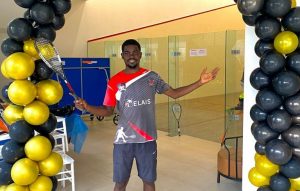For our first blog on the inside track of Squash stories from players around the world, Freddy Nzama from the BKS Club in the Democratic Republic of Congo.

Freddy Nzama (Photo credit: BKS Club)
As our brand ambassador, he shares his thoughts on health benefits and what the Olympics’ inclusion means to him, along with how its inclusion is going to propel the sport to great heights in African nations that have a strong Squash following.
Squash is the healthiest sport
For me, I describe Squash as a “complete workout in under an hour.”
An hour of Squash burns between 600 and 800 calories, and more in the case of intensive practice. It is one of the most energy-intensive sports, ideal.
The view of many fitness experts on Squash has been consistently ranked as one of the world’s healthiest sports is true. Why? It’s simple: squash requires a combination of cardiovascular endurance, muscular strength, and mental acuity that few other sports demand.
As a Squash player, I say you will sprint, stretch, and lunge, working almost every muscle group, along with the quick bursts of activity elevate the heart rate, making it an exceptional form of cardiovascular exercise.
But it’s not just the body that benefits—Squash also sharpens the mind.
Olympics and Squash – the perfect union
The debate around Squash’s inclusion in the Olympics has been long and impassioned. While Squash has yet to make its Olympic debut, the possibility of its inclusion holds significant implications, particularly for African nations.
For countries like the Democratic Republic of Congo, where sports infrastructure is often underdeveloped, the inclusion of Squash in the Olympics could be a game-changer. It would bring much-needed attention and resources to the sport, encouraging investment in facilities, coaching, and grassroots programs. Freddy sees this potential Olympic recognition as a beacon of hope for young athletes across Africa.
The right bid finally came from the United States; Squash caught the eye of the organising committee of the California games. It’s a sport that’s played more on the East Coast. The outcome will be real if we have the guarantee of being on the program indefinitely.
I strongly believe that the spotlight from the Olympics could inspire a new generation of African Squash players. These young athletes would not only gain the opportunity to compete on the world stage but also bring visibility to the unique challenges and stories of their respective nations. The inclusion of Squash in the Olympics could catalyse the growth of the sport across the continent, fostering a sense of unity and pride among African nations.
For me, I would say that it was a slow battle to become a part of the Olympics, thus the presence of Squash in the program of the Olympic Games 2028 and it is a form of achievement for those who have worked for years for Squash to enter the program.
Even for a discipline like ours, which seeks to develop in the landscape, there is still a huge amount of work to be done for African countries like the Democratic Republic of Congo, Nigeria, Zambia, and Zimbabwe.
I think this failure had a big impact on me, and I had put the Olympic dream aside since January 2020, I told myself that we were going to make our way alongside it. I was trying to put some emotional distance between myself and the Olympics, to focus on the professional tour.
The journey continues
Being a Squash player in the Democratic Republic of Congo is not without its challenges. The sport is relatively unknown compared to football and basketball, and access to proper courts and equipment is limited. Yet, for Freddy, these challenges are part of what makes his journey so rewarding.
I can recount the struggles of finding a proper Squash court in his hometown, often having to make do with makeshift arrangements. Equipment is another hurdle—rackets and balls are scarce, and what is available is often prohibitively expensive. Despite these obstacles; my appreciation for the game keeps him motivated.
I enjoy the camaraderie among the small but growing Squash community in the DRC, where players support one another and share tips on how to improve their game despite the limitations they face.
Final Thoughts
What are my dreams of a future where Squash? Well is more accessible in the DRC where young people from all backgrounds can experience the joy and benefits of the sport. I hope that with greater awareness and support, Squash can grow beyond its current confines, offering a new avenue for health, fitness, and personal growth in his country.
In a country where sports can serve as a powerful tool for social change, I see Squash as a means to inspire and uplift. It’s more than just a game—it’s a symbol of perseverance and hope, a testament to what can be achieved with passion and determination, no matter the circumstances.
My experiences on the Squash court remind us that sports have the power to transcend borders, inspire individuals, and bring communities together. In the face of challenges, Squash players in the DRC continue to fight for their place on the court, driven by the love of the game and the desire to be part of something bigger.
To all the people who have contributed and helped me along the way, thank you from the bottom of my heart, it meant everyone, especially Onyx Squash Academy.
